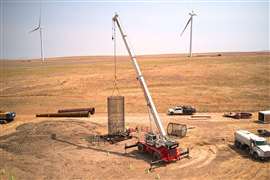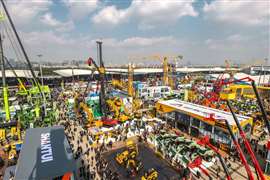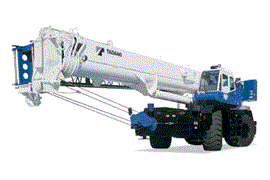Training world
18 December 2012
Jerry Longtin, general manager of Crane Inspection & Certification Bureau (CICB), based in the USA, talks to IC about training and certification opportunities in the country and worldwide.
CICB offers a range of training, inspection, certification and safety services for the lifting and material handling industry, in the mobile, overhead and offshore crane sectors.
Also available are overseas programmes in accordance with international standards. Jerry Longtin, CICB general manager, explains that the company will work to an international standard to suit a customer in any country, including, for example, LOLER and BSI in the UK.
“If a company in a country has a preference for a particular standard then we will provide it. So, for example, Africa; in Nigeria the most commonly used are US standards, depending on the subject and, of course, UK standards. But, if a particular client wants a particular standard, utilised for that region, then we accommodate that.”
Longtin adds, We have training in the Middle East, East and West Africa, and as well as inspections of cranes we have expanded to include business partnerships in South America, Central America and West Africa, where we have been working for a few years ago. We are expanding our recognition and services.”
Longtin says about 20 to 25% of CICB’s work is international. “We would like to expand that, not necessarily because demand will be greater but we are looking to expand our share of the market.”
Looking to the US market, Longtin continues, “We had changes in 2010 with OSHA’s new federal guidelines, with a grace period. That was a driving force for businesses to start working with their operators, riggers and signal personnel to get them certified.”
In industry
The industrial sector, on the other hand, is relatively quiet: “Even though there’s a CCO programme for overhead operators, there’s not a big demand or force behind getting everyone certified. We have a facility in Houston, Texas, with an overhead crane, for people to get their CCO certificate. So we have the capacity for that, we just haven’t seen the demand for that much lately.” Longtin adds, “The legislation is already there but, as far as the CCO is concerned, there is not a huge rush yet for that type of certification for that type of industry. Construction is, of course, very different.”
Turning to the offshore sector, Longtin says recent trips to Nigeria were notable. “I just got back from Nigeria and in offshore there is a big driver for operator qualification in accordance with American Petroleum Institute Guidelines (API), so we use API standards to qualify operators.”
The same is true for the company’s main market, the USA. “At CICB we customise training programmes to meet the customers’ needs, and we do specialised training as well, once we have determined their needs.”
Developments in technology have also had an impact on training programmes. “Since the late 1980s technology has moved at a rapid pace concerning the construction of the crane themselves; with stronger high tension steel, stronger and lighter booms, with the structural strength to lift a great load. And we have computer systems that have become more sophisticated, meaning the operators have to be more savvy about working with them. That’s something that you cannot learn about from a book very well; you have to get out there and practice.”
Longtin adds, “So the technology is coming along fairly well, although, there is still a battle out there for what is the best user-friendly system for people to use.”
Concerning simulators, Longtin continues, “When it comes to operating a crane you have to do it in a crane itself. Simulators are okay; they are a good way to start people out and a good intermediate system and I find them useful but I don’t find them entirely necessary. When you get in the crane it’s a whole different game; you have a long boom, a load that is suspended, the distance of the load, the machine vibration and everything else that’s going on. You have these areas that you will not find on a simulator. They have value, but simulators are still a fairly new concept.”
Combining all this with the state of the economy, despite improvements in the USA, could seem a daunting task. Longtin, however, is philosophical about the situation. “The downturn happened and, a year and half later, new OSHA requirements so, with a down economy and a new standard, it’s like a push-me pull-me type of situation. Longtin concludes, “We have evolved to the new normal as I understand it. Following all the downsizing, etcetera, everyone adjusts to the new normal base.”



